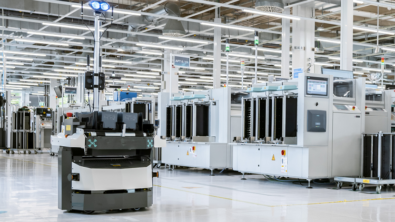Is your company ready for the next wave of industrial transformation?

Allan Behrens of UK-based industry analyst firm Taxal, Ltd., has combined knowledge he gained from global business leaders and his extensive experience in software, hardware, services, channel partners, and consulting organizations across key industries into a new executive brief, The Digital Industrial Revolution. The brief provides insights and best practices on how today’s business executives can adapt and succeed in a world of dynamic change and disruption. As Siemens and our customers are in the throes of this digital transformation while facing a potentially disruptive and uncertain future, we naturally had a few questions for Allan.
Q: Allan, what led you to develop this executive brief?
A: I’ve always been interested in what drives the industries in which we serve and operate in. It’s not about technology, it’s about customer needs and I’ve focused on the voice of the customer. Customers have particular needs and I can empathize with the customer, so everything that a company can do has to fit into those needs. I think the confluence of what customers need and what a company can provide are really interesting, and that’s what drove this particular paper.
Q: You have consulted with hundreds of chief executives over the course of your career. Based on these conversations, what are the top three issues that keep business leaders up at night?
A: The three topics would be opportunity, risk, and competition. It’s useful to let companies think of these in their own terms. All executives think about the opportunities that they may have, such as how to improve their business or develop their business. They are also concerned about the risks and how to mitigate them. And of course, as part of that, where do they sit in the competitive landscape? Are they leaders or laggards? And how to improve on that. I think those are the three one-word answers: opportunities, risks, and competition.
Q: The business world is seeing the consequences of major disruptions over the past few years, from the pandemic, political conflicts with Russia, Ukraine and China, global warming, and current economic uncertainties as tech companies are downsizing. How can business leaders traverse and survive during these times?
A: The most pertinent thing that I think of at this moment is agility and the ability to modify the direction of a business; or modify the outputs or the constituents of the business rapidly to cope with unforeseen circumstances. Part of that is having a portfolio that allows people to have a diverse set of offerings. A “one trick pony” can be difficult to manage when times are tough, and we’ve seen that specifically with what’s happening in Eastern Europe and how it’s affected certain companies with regards their supply chain. So again, risk mitigation, and how to de-risk the business against certain risks is something that companies really need to focus on today. And part of that is how to apply technology to not only provide opportunity, but also mitigate risk. There are several ways of doing that, in manufacturing processes and logistics.
Q: What is one key “take-away” from your research that executives need to focus on to ensure their success in leading a global business today?
A: I think my one takeaway is to be open to change and try to accept some failure. In doing so, the elements of risk aversion will be detrimental to a rapidly evolving and agile business. By being open to change, being open to try new things, especially in areas of technology, you don’t have to commit 100% up front, but the opportunity to try and fail are, I think, key elements among business leaders.
Q: Allan, do you have any further thoughts and insights that executives need to address and apply now to build a better, more profitable future for your employees and customers, and increase shareholder value?
A: Business leaders need to consider their core values and where they should focus. The other thing to consider is where you can leverage other resources such as technology. This will allow you to improve what you do well – to make you do it great. And to differentiate your company from others while providing value to your customers.
Q: Sustainability has been a “top-of-mind” topic, which covers everything from materials waste to low-carbon initiatives, including global warming concerns. What are you hearing from global business leaders about sustainability – and which specific areas are most concerning to address?
A: There is much more sensitivity to the general topic of sustainability, and within each company the sustainability of not only the products it produces, but also internally within the organization. It’s not necessarily just driven by end-users; it’s driven by stakeholders in the business and that includes investors. There is a high level of concern because people are thinking of the future, and how long we will have adequate supplies of, for example, water. Water is a rare commodity to some countries, and it’s not just that – it’s also things like lithium. We can’t continue doing what we did in the past. We need to consider ways of making sure that what we deliver is sustainable to the end market as a producer, and internally, how we can optimize and reduce consumption and waste within the manufacturing companies that we operate. This is high on the list of concerns and a key area of focus for most of the companies that I deal with who are producers.
To read more, download a free copy of The Digital Industrial Revolution. This brief presents key insights and talks about next-generation technologies that can help business executives harness the power of a digitalization strategy to thrive amid global economic and socio-political changes. Topics mentioned include artificial intelligence and machine learning (AI/ML), model-based systems engineering (MBSE), the convergence of information technology (IT) and operational technology (OT), and the Industrial Internet of Things (IIoT), all of which create new opportunities for businesses to develop innovative products and services for a sustainable future.
Siemens Xcelerator software for industry is aimed at helping companies make the digital transformation necessary to participate in the next industrial revolution. To see how we are walking the walk, not just talking the talk, and making digital transformation real (Siemens has applied its own technologies in its factories) visit our website: Siemens Xcelerator as your digital transformation strategy | Siemens Software


